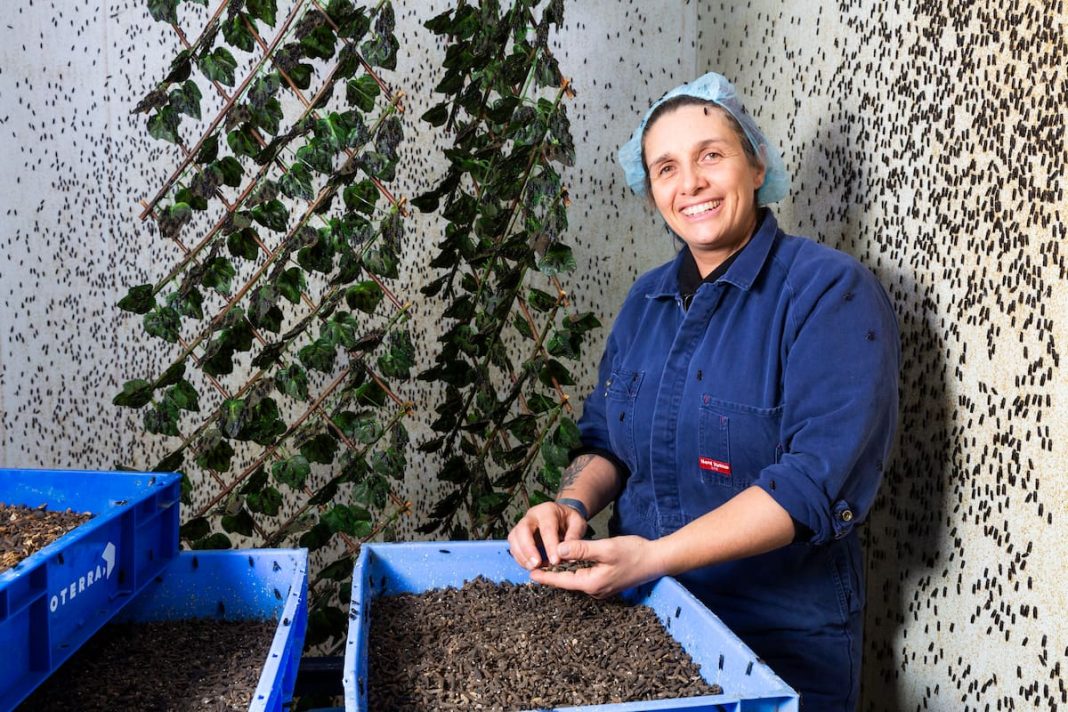If you think the flies are bad this season, consider the 90 million black soldier fly larvae living at Hume, doing great things for the environment.
Amongst the non-descript industrial buildings at Hume, sit nine shipping containers each containing 340 trays, with each tray holding 33,000 maggots. This is Goterra’s workforce, and they’ve just undergone a million-dollar upgrade to process more food waste.
This is world-first, ground-breaking stuff and it was born in Canberra. It’s entomology 101: fly larvae breaking down food waste, preventing it from going into landfill.
So, while we’re busy throwing out tonnes of leftovers, Goterra’s “soldiers” are processing up to 12,000 tonnes of food waste a year. These hard-working insects convert food waste into protein and fertiliser in just 12 days.
As if that’s not impressive enough, the founder of Goterra, Olympia Yarger, even has a species of soldier fly named after her: Hermetia Olympiae.
I spoke with Olympia (the person, not the fly) about the recent million-dollar expansion at Hume.
“In the last few months, we’ve completed a million-dollar site upgrade at the Hume facility to be able to process more waste more efficiently and to process the off-take products on site,” Olympia said.
“The most impact we can have on the climate is diverting food waste from landfill because the process that we’ve done saves up to 97 per cent CO2 emissions compared to food sitting in landfill. We basically want to take all of the really hard-to-manage food waste.”
Goterra’s simple maggot-in-a-box concept is, surprisingly, a world-first. Woolworths and Coles are lining up to pay Goterra about $180 per tonne for their commercial food waste (competitive with the price of landfill).
“The great thing is that it aligns with is the ACT Government’s Circular Economy Strategy and Action Plan, which is putting pressure on businesses to put their food waste reduction plans in,” Olympia said. “The deadline is next year, all commercial businesses need to have a plan, they can’t be sending food waste to landfill. There are plenty of businesses in Canberra that are still sending it to the Mugga Lane tip, and we are the only facility in Canberra that can handle commercial organic waste at scale.”
Goterra is expanding at an amazing rate. What started as just a bucket in Olympia’s garage in 2016, is now seven production sites across four states. Goterra is about to open a new site in Western Sydney to service Woolworths stores – the equivalent to 3,000 tonnes of food waste per year.
“We believe climate change is the crisis of our time,” Olympia said. “We exist to help solve it.”
In Australia, we waste 7.6 million tonnes a year. Most of it ends up in landfill, where it rots and produces methane (24 times the global warming potential of CO2 from your car exhaust). The cost of food waste, globally, is about $940 billion a year.
Olympia is indeed lord of the flies, reducing landfill and carbon emissions while simultaneously generating sustainable protein and fertiliser for animals and crops, which put food on our table – the circle of life.
For more information, visit goterra.au



